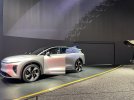Larger batteries weigh more, and unlike internal combustion engine vehicles, do not get lighter as the "tank" is emptied. In EVs (BEVs, HEVs, PHEVs), you are pulling around the full weight of the battery regardless of the state of charge. So EVs with smaller batteries may have a shorter electric-only range but will be more efficient due to the lesser weight being pulled around; and with smaller, lighter batteries, smaller, lighter, less-powerful electric drive motors will be needed. Smaller batteries also take less time to charge; on long road trips, you may have to stop more often but each stop will be shorter.
That is assuming that EV drivers will take their cars on long road trips. With the general lack of charging infrastructure here in Southern Ontario, Canada, my wife and I (as an example and perhaps representative of many prospective EV buyers) are afraid to take EVs on long road trips.
But my wife has worked out that when her new Prius Prime is delivered, it will have enough electric-only range that she will be able to commute in EV mode only and maybe only have to recharge every 2nd day or so. The gasoline engine backup should only be needed when she visits her sisters in a neighbouring city that is outside the electric-only range.



